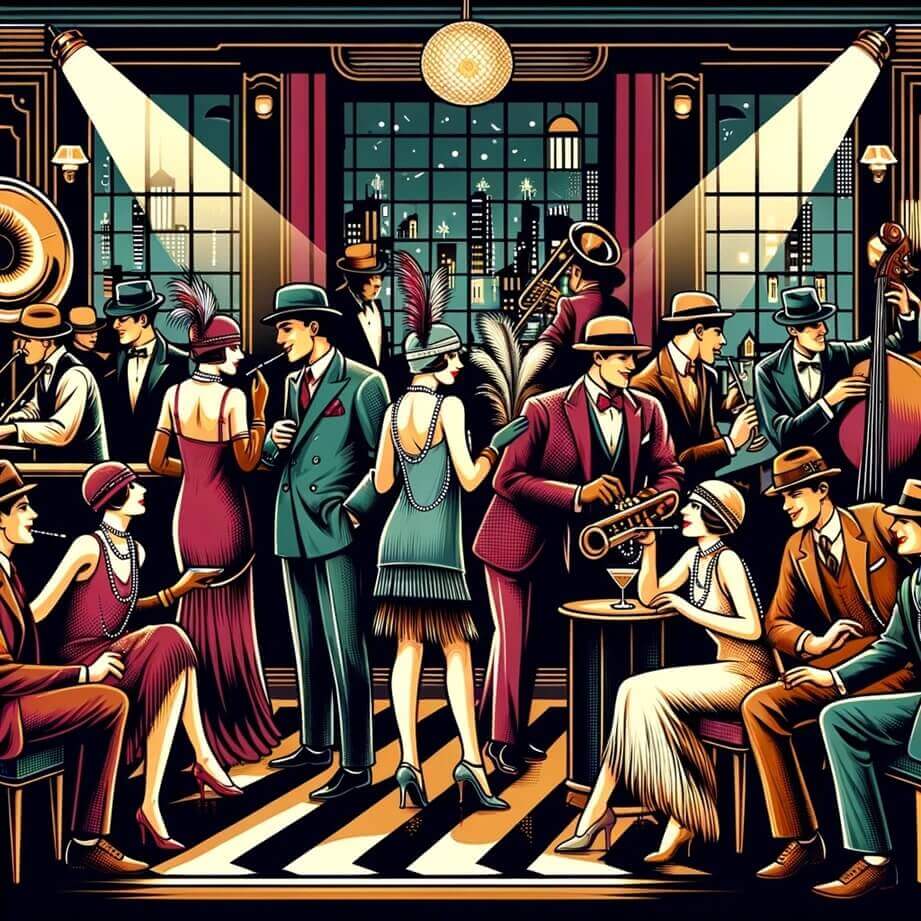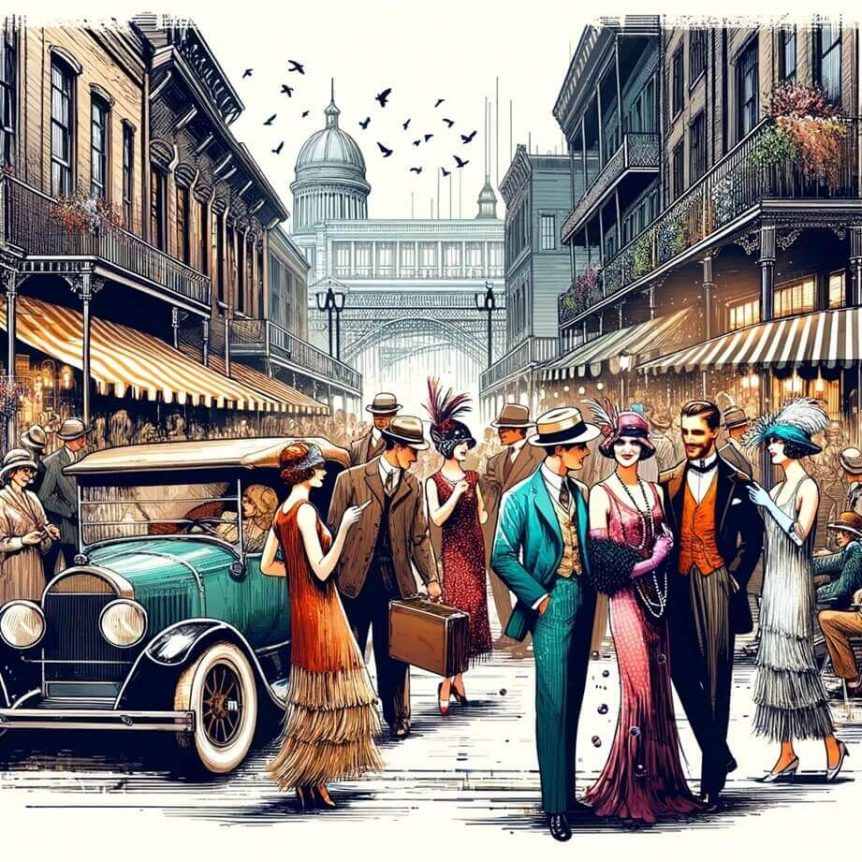The 1920s, or the roaring twenties as it was commonly and affectionately known, was a decade of pure vibrancy, joy, and even sex appeal. It was also a huge social shift, bringing forth a new era of cultural decadence. Against the backdrop of jazz music and ‘flapper fashion,’ the era was equally renowned for its unique linguistic traits of 1920s slang.
But if you take a deeper look at slang in the 1920s, you might appreciate these expressions were part of a wider identity and rebellion against the old-fashioned traditional norms. You might even say it was a way for the youth to assert their independence and make their mark on the world.
A New Way of Speaking
1920s slang was the language of the extraordinary person, the bee’s knees, if you will. It demonstrates the very fiber of an era that was all about breaking boundaries and experimenting with new ways of living.
At Lighthouse Online, we are fascinated by the languages of the world in whatever form they take – including the more quirky side of them, like the rich world of slang. Through this blog post, we shall take you on a linguistic journey back to the 1920s and revisit some of the slang from that fabulous period.
We’ll explore the common 1920s slang terms that colored everyday conversation, from ‘bee’s knees‘ to ‘big cheese.‘ From ‘soup job’ to describing a pretty woman. Or even labeling someone you might describe as a gullible person or a ‘money man‘. We will cover them all!
So, put on your dancing shoes, and let’s remember the carefree ‘cat’s meow’ world of 1920s slang!
Everyday Slang: The Talk of the Town
In the roaring twenties, the streets were alive not only with new music and fashion but also with fun, novel, straight-out-of-leftfield expressions. Let’s take a look through some everyday 1920s slang that added a touch of verve to the daily chatter of that lively decade.
- “Bee’s knees”: This phrase was the epitome of excellence, used to describe something or someone extraordinary.
- “Cat’s meow”: Similar to the bee’s knees, this term was used for people or things that were outstanding.
- “Big cheese”: This refers to someone important or influential – a VIP in today’s terms.
- “Flat tire”: A not-so-flattering term used for a boring or disappointing date.
- “Doll”: A term of endearment for a pretty woman.
- “Giggle water”: A playful name for alcohol, highlighting its effects to make people laugh and loosen up.
- “Baloney”: Used to call out nonsense or something unbelievable.
- “Banana oil”: Much like baloney, this phrase calls out deceit or exaggeration.
- “Hotsy-totsy”: Describing something or someone as perfect or just right.
- “Speakeasy”: An illicit establishment selling alcoholic beverages during Prohibition.
Everyday 1920s slang terms were the lifeblood of normal conversations, from casual chats on the street corner to whispers in hidden speakeasies, showing the era’s flair for creativity and rebellion against the mundane.
Slang in Social Circles
However, the 1920s offered far more than jazz and jive, culturally speaking. It was also an era where social circles had their own unique lingo. Through this section, we will look at the slang used by specific groups like the iconic flappers and the intellectual circles of the time.
- “Flaming youth”: Refers to a group of young people known for their wild and flamboyant behavior, often seen as the epitome of the Roaring Twenties’ spirit.
- “Sheba” and “Sheik”: Used for a pretty woman and her male counterpart, respectively, often implying a sense of style and sex appeal.
- “Olive”: A term used for a person easily convinced, often naïve or inexperienced in the ways of the world.
- “Cake-eater”: Refers to a well-dressed man who was a bit of a ladies’ man, typically from the upper class.
- “Gold digger”: A term that needs little introduction, as its meaning has scarcely changed – a person, typically a woman, who forms relationships for financial gain.
- “Wet blanket”: Used to describe an excessively puritanical person, one who dampens the party spirit.
- “Dapper”: A compliment for someone, usually a man, who is dressed impeccably.
- “Gigglemug”: A slang term for someone who is always smiling or in a good mood.
- “Struggle buggy”: A humorous term for a car where romantic encounters occur, reflecting the era’s changing attitudes toward dating.
- “Petting pantry”: A slightly more risqué term for movie theaters, known for being places where couples would get cozy.
In social circles, 1920s slang was almost like a declaration of one’s identity and a way to connect with like-minded individuals. From the daring flappers to the philosophical thinkers, each group brought a unique twist to the urban shift of the time.
Speakeasies and Jazz

As night fell, the 1920s came alive with its own unique set of slang (some of which we still use today) around the world of speakeasies and jazz. Let’s take a look.
- “Blind tiger”: A term for speakeasies, indicating the secretive and often illegal nature of these establishments.
- “Juice joint”: Another name for a speakeasy, where the ‘juice’ was not your typical fruit punch but a euphemism for alcohol.
- “Zozzled”: Slang for being drunk, capturing the sometimes-overindulgent spirit of the Jazz Age.
Miscellaneous Slang of the 1920s
Aside from the aforementioned 1920s slang, there are a few less commonly used terms and sayings that are also worth mentioning, covering a wide range of different scenarios.
- “Not a good fellow”: Used to discreetly indicate someone untrustworthy or dubious in character. It was a subtle way of warning others without causing a scene.
- “Brash young woman”: This term describes a woman with bold manners and a forward attitude, often associated with the flapper lifestyle.
- “Not necessarily Mafia”: A phrase used to describe dubious activities or individuals that were suspicious but not directly linked to organized crime.
- “Honest Squeeze”: a female companion or girlfriend.
- “A few drinks”: A common euphemism for indulging in alcohol, especially in the context of speakeasies and secret drinking sessions during Prohibition.
- “Wrong person”: This term was often used in secretive conversations to indicate a mistake in identity, especially in dealings that required discretion.
- “The advantage Bulls”: Plainclothes railroad cops.
- “Smart person”: This was a compliment for someone who was street-smart and savvy, particularly in urban settings.
- “Bay window”: A humorous yet slightly unflattering term for a man’s pot belly.
- “Gooseberry lay”: Stealing clothes from a clothesline.
- “Sneaky person”: A slang for someone who is cunning and deceptive, often involved in underhanded dealings.
- “The money man”: The man with the bankroll.
- “Money keen”: Describing someone with a strong focus on acquiring wealth, often at any cost.
- “Trouble boys”: A term used for groups of young men known for causing mischief or getting into minor legal troubles.
- “Person marked”: This phrase indicates an individual targeted for a scam or a setup, often used by con artists.
- “House dick”: Slang for a detective or security officer, usually employed by a hotel or similar establishment.
- “Flophouse”: Refers to a cheap transient hotel, often with less-than-ideal living conditions, used by people down on their luck.
- “Yegg”: Safecracker who can only open cheap and easy safes
- “Glad rags”: Fancy clothes
- “A Strong Man Bimbo”: A Tough Guy
Final Thoughts
As we tip our hats to the Roaring Twenties, we are reminded of how 1920s slang not only blessed the era’s conversations but also mirrored its vibrant spirit in some way. We adore some of the slang terms used above and hope that they continue to be a part of our language forever more!
As one of the world’s leading translation services, you might be surprised how often we receive strange slang and terminology in some of the literature that crosses our desks. Either way, regardless of how quirky the language is (including some of the more ‘out there’ terms on this list we bring you today), you can be assured that Lighthouse Online will translate everything accurately, precisely, and quickly.
Get in touch today for a “baloney-free” translation experience you can trust!


